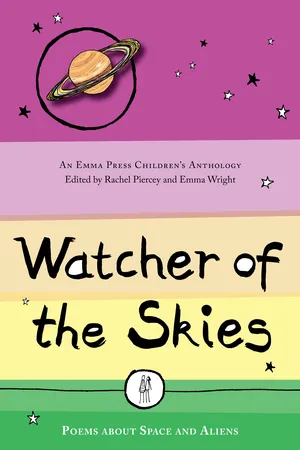
This is a test
- English
- ePUB (mobile friendly)
- Available on iOS & Android
eBook - ePub
Book details
Book preview
Table of contents
Citations
About This Book
How big is the universe? Are there dogs in space? What if your friend – or your granddad – was an alien? Join the poets in wondering in Watcher of the Skies, a sparkling collection of poems about the outermost possibilities of space, life and our imaginations. Fully illustrated by Emma Wright and accompanied with helpful facts from space scientist Rachel Cochrane (Institute for Astronomy, University of Edinburgh) and ideas for writing poems from Rachel Piercey, this is the perfect companion for any budding stargazer or astronaut.
Frequently asked questions
At the moment all of our mobile-responsive ePub books are available to download via the app. Most of our PDFs are also available to download and we're working on making the final remaining ones downloadable now. Learn more here.
Both plans give you full access to the library and all of Perlego’s features. The only differences are the price and subscription period: With the annual plan you’ll save around 30% compared to 12 months on the monthly plan.
We are an online textbook subscription service, where you can get access to an entire online library for less than the price of a single book per month. With over 1 million books across 1000+ topics, we’ve got you covered! Learn more here.
Look out for the read-aloud symbol on your next book to see if you can listen to it. The read-aloud tool reads text aloud for you, highlighting the text as it is being read. You can pause it, speed it up and slow it down. Learn more here.
Yes, you can access Watcher of the Skies by Emma Dai'an Wright, Rachel Piercey in PDF and/or ePUB format, as well as other popular books in Literature & Poetry. We have over one million books available in our catalogue for you to explore.
Information
Interview with space scientist Rachel Cochrane
Thank you for writing the notes in this book! Can you tell us a bit about the work you do?
I study galaxies and how they evolve over time. I use data from large surveys to study the properties of galaxies, like how fast they are forming stars, how massive they are, and the environments they are in.
What made you want to be a space scientist?
I was eager to learn more about galaxy evolution and excited by the opportunities to observe at telescopes in unusual places. As part of my PhD I travelled to La Palma to observe galaxies on the William Herschel Telescope.
How can I get involved in astrophysics?
You can contribute to astrophysics research with any level of experience with ‘citizen science’. Try www.zooniverse.org for some space-themed projects.
What’s your favourite space fact?
Even though Andromeda is our closest neighbouring galaxy, the light we receive from it was emitted before humans like us existed on Earth!
Finally, what’s your favourite poem in Watcher of the Skies?
‘Recipe for Cosmic Cup Cakes’ is my favourite poem. Usually scientists try to break things down to understand them, but this poem mixes everything up into a fantastical dessert.




Rachel grew up in London but has now crossed the border to study for a PhD in Astrophysics in Edinburgh.
Write your own poem!
Fancy writing your own poem and maybe illustrating it afterwards? Watcher of the Skies editor Rachel Piercey has come up with some ideas to get you started.

In ‘Recipe for Cosmic Cup Cakes’, Julie Anna Douglas throws various aspects of space into the mixing bowl. Write your own cosmic recipe for another kind of food, for example Star Stew or Moon Muffins. Try to include some relevant ingredients – so if it’s Star Stew, you might have hydrogen, helium and mouldy old light.
Where will you serve your food, on what, and to whom? Let your imagination run riot!

Dale Neal’s ‘granddad Burt’ does traditional grandfatherly things such as telling bedtime stories and going to the optician, but with an extra-terrestrial twist! Choose someone close to you and note down the different stages of their day, from when they get up to when they go to bed. Then introduce an alien aspect to each of these activities, and write a poem which describes a day in their not-so-ordinary life.

Space scientist Rachel Cochrane tells us that the light from the Andromeda galaxy has been travelling for 2.5 million years to reach our eyes. Write a poem called ‘Song of Old Light’, describing what the light has seen along its journey (feel free to mix fact with fiction), and how it feels to reach our human eyes.

In ‘Message for Rosetta’, the Rosetta probe contains a disk etched with 1000 different languages. It would need a lot of coincidences for any aliens out there to find and be able to read these words, but it’s a hopeful start!
Imagine you are stocking a capsule to send into space on a search for alien life. What would you include in this capsule to represent life on Earth? Will you focus on items associated with your particular home or country, or the whole world, or a mixture of both? Will the items all be physical objects or might you include some abstract ones, such as feelings and characteristics? Jot down some ideas, then choose your favourites to create your poem.

In his poem ‘The Way Planets Talk’, Dom Conlon imagines how the characteristics of the planets influence the way they ‘speak’. Sarah Doyle does this specifically for the planet Uranus in her poem ‘Uranus: Roll Up, Roll Up’.
Choose a planet to research and then write a poem in its voice. First of all, write down the key characteristics of your planet (size, temperature, what it’s made of etc) and then note down ideas for how your language could reflect each of these characteristics. For example, Venus is the hottest planet, so you might use lots of words which create the sensation of boiling heat. Jupiter spins fastest on its axis, so you could try creating a dizzying effect – but it’s also the biggest planet and named after the Roman king of the gods, so you might use some regal language too.
Use your notes to write your poem, thinking carefully about how to order the details for the best effect.

Humans have given names and stories to groups of stars for thousands of years. We have drawn from the human worl...
Table of contents
- Watcher of the Skies
- Contents
- Introduction
- How to Brush Your Teeth in Space
- Comet
- Stars? Dust? Us?
- Art 101 for Aliens
- But how big is the universe?
- Recipe for Cosmic Cup Cakes
- My granddad Burt’s an alien
- Milky Way Disco
- The Starry Messenger
- Compared to What?
- Message for Rosetta
- High Frontier
- A Dog in Space
- Letters
- Many Moons Ago
- The Way Planets Talk
- Alien Boy
- Up Above
- The Algonquin Calendar of Changing Moons
- Poets in Space!
- Emily Dickinson in Space
- Shakespeare in Space
- Ted Hughes in Space
- Ono no Komachi in Space
- Lord Byron in Space
- Solar System Candy
- The Alien Restaurant
- Countdown
- Uranus: Roll Up, Roll Up
- The Hungry Galactic Plug Hole
- Stars
- How to get to Zagnaraputta
- Watcher of the Skies Bonus Bits
- Interview with space scientist Rachel Cochrane
- About the Emma Press
- Also from the Emma Press
- Acknowledgements
- Copyright